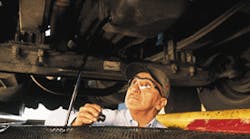A new study indicates that trucking companies are increasingly outsourcing equipment maintenance work to third parties. Justin Zohn, senior consultant for Toledo, OH-based full service transportation research and consulting firm Havill & Company noted that a boom in maintenance service providers over the past five years has shifted the focus of many trucking companies back to their core business.
Havill & Company has recently completed its U.S. Commercial Fleet Market Forecast study, which identifies trends in the commercial fleet market for the benefit of its clients, which includes suppliers to the trucking industry.
“A lot of feedback is that [commercial fleets] were continuing to look at outsourcing opportunities to alleviate the on-site maintenance burden,” Zohn told Fleet Owner. “Trucking companies outsource to another party by either moving their operations off-site or having a third-party facility management group actually take over their on-site facility. In some cases they even purchase all of the assets— this allows trucking companies to focus on their core business and have a professional company doing [maintenance work] as efficiently as possible.”
Zohn believes that the rising outsourcing trend is the result of businesses paying new attention to maintenance services.
“Somebody got in their mind that, for example, a company that manufactures cabinets and has a fleet of 50 trucks is not in the business of maintaining those trucks-- just manufacturing cabinets,” Zohn said. “There have been a lot of smaller and midsize companies providing those services and third party maintenance providers popping up across the country. Many of these types of companies that are around today weren’t around five to six years ago.”
Also a factor is commercial vehicles are utilizing more complicated technology.
“I would say that one of the impacts the increasingly sophisticated technology has had is that fleet managers now want to standardize their vehicles,” said Zohn. “For example, if I’ve got 20 trucks comprised of five different models, converting the fleet to the same model would make the technician an expert on one particular model—as opposed to diluting his expertise across five different models. People are starting to take notice of that when they look at their vehicle acquisition plans.”
Maintenance is only one topic covered by the U.S. Commercial Fleet Market Forecast. Other topics include vehicle procurement, advanced vehicle and fuel technologies, refueling and payment methods, leasing and fleet management.
For more information on the study, go to www.havillconsultants.com.




